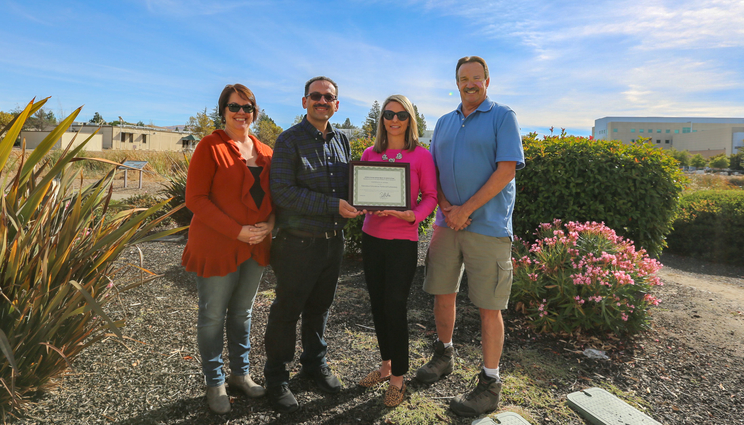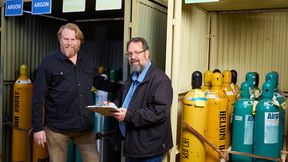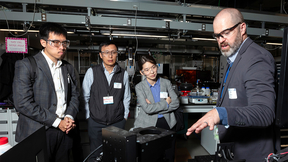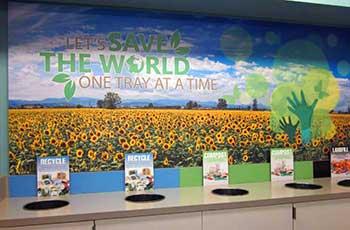Lawrence Livermore receives USDA award for purchasing bio-based materials
 (Download Image)
Jacqy Turner, Orlando Soto, Christa Ormonde and John Kitchuck received the USDA award on behalf of the Laboratory. They have been identified and recognized for their contributions towards meeting the Lab’s sustainable purchasing goals.
(Download Image)
Jacqy Turner, Orlando Soto, Christa Ormonde and John Kitchuck received the USDA award on behalf of the Laboratory. They have been identified and recognized for their contributions towards meeting the Lab’s sustainable purchasing goals.
Lawrence Livermore National Laboratory (LLNL) received an award from the United States Department of Agriculture (USDA) Bio-preferred Program for purchasing bio-based materials that includes all the compostable products used in Laboratory cafeterias and bio-based cleaning products used by the custodial division. The award, presented to LLNL, was "For your leadership in advancing USDA’s goals to support the purchase and use of bio-based products which are contributing to the U.S. economy, U.S. jobs and rural prosperity."
LLNL has worked for the past several years to convert many products used in the food services program and custodial division to bio-based alternatives. Besides the benefit of reducing the use of non‐renewable resources, LLNL has realized a wide array of rewards from using bio-based products in the Lab’s cafeteria’s and facilities. LLNL has overcome barriers to the adoption of bio-based products by pilot testing products, identifying ways to balance the costs of bio-based products that at first appeared higher and realizing other paybacks such as municipal waste reduction and less impact to human health.
"It’s been a long journey to introduce and implement biodegradable products to our food service operations," said Orlando Soto, who serves as the group leader for distribution services and was the former group leader for Supply Services, which encompasses oversight of food services at the Laboratory. "Along with introducing bio-preferred products, came the education to our customers and guests to ensure the success of the program. It has been very gratifying and well received. As the environment changes, we will continue to look at new bio products, enhancements and introduce new products/concepts to our food service operations."
Café compostable products
To support purchasing and waste reduction sustainability goals, LLNL’s food services program made a commitment to switch all food serviceware to bio-based compostable products in addition to encouraging use of durable (reusable) goods. Compostable products include hot cups, cold cups, cutlery, lids, straws, takeout containers, napkins, soup cups, small sides/condiment containers and to-go bags. Different compostable items from various vendors were reviewed by LLNL food services staff as well as pilot tested in the cafeterias. There is a significant cost difference, especially for knives, forks and spoons between standard plastic and 100 percent compostable serviceware. However, LLNL decided that having all compostable products would help clear up confusion for employees trying to sort their waste products and would result in cleaner diversion streams for compostables and recyclables. To do this, the Lab took on the role of purchasing these products instead of requiring the food service vendor to do so.
Both LLNL on‐site cafeterias have designated waste collection areas with detailed graphics, signs and bins to encourage better separation of recyclable, compostable and trash items into the correct bins.
The compostable serviceware products also are used by LLNL’s catering services. The use of bio-based compostable products contributed to LLNL’s sitewide collection (and diversion from landfill) of 68 metric tons of compostable waste in FY2017.
Green cleaning products
The LLNL custodial department proactively identifies, tests and purchases several bio-based products. LLNL has had a green cleaning program in place for more than a decade and is always looking for products that are better for the environment and human health and purchases bio-based products when available and performance is acceptable. Nearly all cleaning products used by the custodial division meet or exceed specifications, standards or labels recommended by the Environmental Protection Agency.
Although sometimes more expensive, generally the Lab has found that many of the green cleaning and bio-based products "go further" than traditional products (e.g., they come in highly concentrated forms that can be diluted to ratios suitable for the job at hand), which makes them cost comparable to non-bio-based products. Also, prices have come down over the years and are now more comparable.
For LLNL, the health impacts to custodians was a big reason behind switching to bio-based products. When the Lab switched to a metal‐free floor finish (Green Seal) and floor stripper (Ecologo), it helped eliminate hazardous floor care effluent, which was a significant portion of the Lab’s overall hazardous waste generated each year. LLNL is currently researching products to transition to a bio-based floor care products system as well.
Contact
 Carrie L Martin
Carrie L Martin
[email protected]
(925) 424-4715
Related Links
USDA Bio-preferred ProgramTags
Community OutreachEnvironment Safety and Health
Featured Articles








